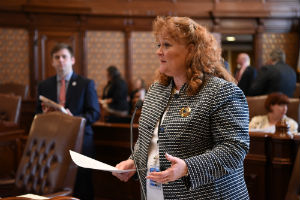- Details
 SPRINGFIELD – A measure that passed out of the Senate today will add an extra protection for victims of domestic violence, thanks to Des Plaines Democrat State Senator Laura Murphy.
SPRINGFIELD – A measure that passed out of the Senate today will add an extra protection for victims of domestic violence, thanks to Des Plaines Democrat State Senator Laura Murphy.
Senate Bill 399 would allow an address to be omitted from documents filed in court if disclosing the address would risk abuse or harm. The victim would also be protected from having to include a domestic violence safe house address or an address that was changed as a result of a protective order.
“It’s already hard enough for victims to take that first step and get out of their situation,” Murphy said. “They shouldn’t have to live in fear after being brave enough to get away because of the possibility of their address being released by a legal official.”
Murphy’s measure is in response to an incident where the judge included the address of the domestic violence safe house in a court order between the abuser and the victim regarding custody over their child.
Senate Bill 399 passed the Senate with unanimous bipartisan support and now moves to the House for consideration.
- Details
 SPRINGFIELD – State Senator Laura Murphy (D-Des Plaines) advanced legislation today that would allow investigations of alleged sexual harassment in local government to fall under the authority of the Executive Inspector General.
SPRINGFIELD – State Senator Laura Murphy (D-Des Plaines) advanced legislation today that would allow investigations of alleged sexual harassment in local government to fall under the authority of the Executive Inspector General.
Sexual harassment allegations are extremely serious. When it was discovered that there was a loop hole and local elected officials were not protected under any current sexual harassment laws, it was concerning.
Murphy’s measure gives the Executive Ethics Commission and the Executive Inspector General jurisdiction over sexual harassment allegations at the local government level and the authority to investigate these charges.
“There have been multiple examples of sexual harassment at the local level,” Murphy said. “Letting the Executive Inspector General have the ability to investigate these allegations will help tremendously by allowing these investigations to be done properly.”
Senate Bill 1223 passed the Illinois State Senate with bipartisan support and now moves to the House for consideration.
- Details
 SPRINGFIELD – A measure passed by the Illinois Senate would require sexual assault between students at school to be reported, thanks to Des Plaines Democrat State Senator Laura Murphy.
SPRINGFIELD – A measure passed by the Illinois Senate would require sexual assault between students at school to be reported, thanks to Des Plaines Democrat State Senator Laura Murphy.
Murphy’s measure would require school districts to submit annual reports of sexual assault incidents between students to the Illinois State Board of Education.
“This is a step forward in cracking down on sexual assault,” Murphy said. “Young people are impressionable, and we need to monitor and exterminate this behavior now. Students have homework and tests to worry about; they shouldn’t fear going to school because they might be sexually assaulted.”
In October of 2017, NBC news highlighted the rise in student against student sexual assault and the lack of state laws requiring schools to report these incidents. Thirty-eight states require school districts to report these cases. If this measure passes the House, it will make Illinois the 39th state.
Senate Bill 1249 passed the Illinois State Senate and now moves to the House for consideration.
- Details
 DES PLAINES – Area residents who wish to learn more about clean energy in Illinois are invited to a town hall meeting Tuesday, April 23, in Elk Grove.
DES PLAINES – Area residents who wish to learn more about clean energy in Illinois are invited to a town hall meeting Tuesday, April 23, in Elk Grove.
State Senator Laura Murphy (D-Des Plaines) will host the discussion at the Elk Grove Park District Garden Terrace along with State Representative Marty Moylan and State Representative Michelle Mussman.
The Illinois Sierra Club, Illinois Solar Energy Association and Citizens Utility Board will be speaking about Illinois programs regarding clean energy and ways to reduce your energy bills.
“Our state has been working on multiple programs to ensure that Illinois moves toward more clean energy in the future,” Murphy said. “This town hall offers residents a chance to learn about these different programs and how they can do their part as well.”
What: Town hall meeting regarding clean energy
When: 6:30 p.m. Tuesday, April 23
Where: Elk Grove Park District Garden Terrace in the Pavilion Meeting Room, 1000 Wellington, Elk Grove.
Who: State Senator Laura Murphy, State Representative Marty Moylan, State Representative Michelle Mussman, Illinois Sierra Club, Illinois Solar Energy Association, Citizens Utility Board
More Articles …
Page 86 of 119







